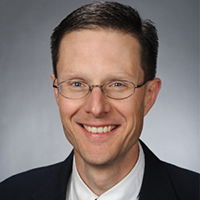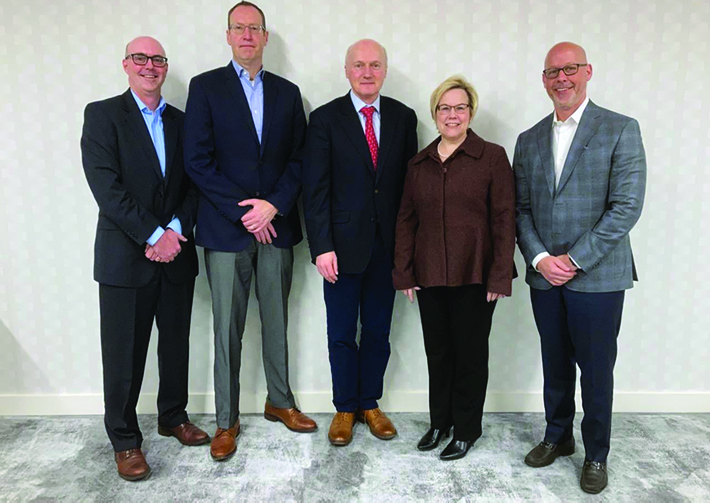
Outreach: Building Relationships
Exo Technology Center of Excellence Seeks Participants in Medical Practitioners Survey
ASTM International’s Exo Technology Center of Excellence (ET CoE) has debuted a new survey aimed at confirming gaps and opportunities in medical exoskeleton certification, standards, and best practices.
Recognizing that medical exoskeletons have the potential to transform physical rehabilitation and patient handling, the ET CoE team is looking for participation from medical practitioners to identify and validate foundational information related to medical exoskeletons.
The survey purpose is to collect input and feedback from practitioners that use or have considered using medical exoskeleton products with a variety of patients with relevant conditions.
“The information solicited will help ASTM International’s exoskeletons and exosuits committee (F48) develop relevant standards to support and enhance the growth and success of the exoskeleton industry,” notes William Billotte, Ph.D., ASTM ‘s director of global exo technology programs. “The survey findings will be carefully analyzed, and the identified needs, concerns, and opportunities will be summarized and prioritized.”
Anticipated key outcomes include, but are not limited to:
- Understanding this population’s experiences with and perceptions regarding different types of exoskeleton technologies;
- Patient/user feedback;
- Identifying types of products selected and what conditions they serve as well as potential discretionary measures to select between similar products;
- Understanding the evaluation process used by each group;
- Identifying research and information gaps;
- Identifying common trends and experiences; and
- Understanding current barriers to the use of exoskeletons by patients.
- National Safety Council Signs Memorandum of Understanding with ASTM International
Representatives of ASTM International and the National Safety Council (NSC) recently signed a memorandum of understanding (MoU) supporting advanced and emerging technologies.
The MoU is intended to promote the advancement of technologies, including exoskeletons and exosuits (exo), robotics, automation, and autonomous systems, and to ensure that standards address key safety components within these areas.
The agreement was signed by Nicholas Smith, NSC’s chief operating officer, and Brian Meincke, ASTM vice president, global business development and innovation strategy.
“ASTM International is excited to work with NSC to promote the development and use of standards for advanced and emerging technologies,” notes Meincke. “We look forward to identifying how this partnership can support the development of key safety components within these emerging industries.”
“Technology and safety go hand in hand and have ample opportunities to benefit each other,” adds Smith. “The National Safety Council looks forward to working with ASTM International to save lives and reduce injuries through emerging technology, and thanks them for their commitment to safety.”
Objectives of the ASTM International and NSC MoU include:
- Promote communication between the two organizations;
- Promote knowledge of ASTM standards and benefits of ASTM membership to NSC members;
- Promote knowledge of NSC and benefits of NSC membership to ASTM members;
- Increase expert input from NSC into the development of ASTM exo, robotics, automation, and autonomous system standards and other areas of common interest; and
- Pursue safe and reliable exo, robotics, automation, and autonomous systems technologies through awareness and education activities such as workshops, symposia, training events, and conferences.
ASTM International’s committee on exoskeletons and exosuits (F48) was formed in 2017 to develop standards that address safety, quality, performance, ergonomics, and terminology for exo systems and components during their full life cycle. ASTM’s Exo Technology Center of Excellence (ET CoE) focuses on accelerating exo standards through research, education, workforce development, training certifications, and connecting global exo communities. READ MORE about the ET CoE.
Last year, the scope of the ASTM robotics, automation, and autonomous systems committee (F45) was expanded. The scope now includes standards development for automatic, automated, and autonomous vehicles, robotic arms and manipulators, and sensors used in these systems, for smart infrastructures, advanced manufacturing, logistics, and other automation.
Presentations Invited for ICAM 2022
Presentations are being invited for the 2022 ASTM International Conference on Additive Manufacturing (ICAM 2022), hosted by ASTM’s Additive Manufacturing Center of Excellence (AM CoE) and supported by more than a dozen ASTM technical committees. The conference will be held Oct. 31–Nov. 4 at the JW Marriott Orlando Bonnet Creek Resort and Spa (Orlando, Florida).
ICAM 2022 is ASTM International’s seventh annual flagship event related to standardization, qualification, and certification with a focus on industry-specific requirements addressing the entire AM process chain.
The ICAM program consists of 27 symposia covering major topics and key areas. The conference is organized by more than 100 scientific committee members, all advanced manufacturing experts from industry, academia, government and regulatory agencies, national labs, and more.
Authors are invited to submit their abstract, outlining the scope of their presentation in no more than 300 words, to one of the 27 different conference topics. These topics include, but are not limited to:
- Feedstock materials,
- Fatigue and fracture,
- Mechanical testing,
- Nondestructive evaluation,
- Defense,
- Space,
- Construction,
- Industry 4.0,
- Robotics, and more.
A full list of conference topics can be found on the ICAM 2022 website. Authors of accepted abstracts will be invited to present in Orlando.
ICAM 2021 featured a five-day hybrid event with over 475 sessions, 11 live panel sessions, seven keynote addresses, 17 awards presented, and more than 850 registrants from over 30 countries globally.
Building upon the success of the previous events, ICAM 2022 will involve more ASTM committees and external stakeholders, convening experts worldwide to exchange information about the latest developments in the field of advanced/additive manufacturing, with an emphasis on the transition of research to application.
ASTM International Selected to Support Three New America Makes Projects
ASTM International’s Additive Manufacturing Center of Excellence (AM CoE) is participating in three new America Makes projects aimed at advancing the adoption of additive manufacturing (AM).
These projects, totaling over $1 million in combined efforts, address critical aspects of the AM industry, including training, inspection, qualification approaches, and in-process monitoring.
“We are proud to be selected to launch these projects that will train the AM industry’s workforce and equip them with new tools to solve quality and inspection problems,” said Mohsen Seifi, Ph.D., ASTM International’s director of global additive manufacturing programs. “America Makes has been a key contributor in the development and maturation of AM technologies, with key insight on the important role standardization and training plays in further adoption and industrialization of additive manufacturing.”
The three projects funded by America Makes include:
01
Introductory Inspection and Quality Assurance (QA) of AM Using the AMES Test Artifact — The project focus is to develop an introductory course on quality assurance and inspection for AM, intended for audiences ranging from beginners to QA or AM professionals who wish to expand their existing knowledge. The project is led by the ASTM AM CoE and supported by Castheon. (America Makes Project 5001.002.001.004)
02
Best Practices for AM Part Families Relating to Product Qualification and Certification (Q&C) — This project aims for the development of definitions, best practices, and guidance to enable the application of a part family framework for Q&C, enabling similar parts to be qualified using shared/common material data and reducing both time and cost. The project includes participation of dozens of aerospace and defense corporations, including Boeing, Airbus, Raytheon Technologies, Northrop Grumman, Lockheed Martin, and others. It is led by ASTM’s AM CoE and is supported by the U.S. Federal Aviation Administration and NASA. (America Makes Project 5001.002.002.003)
03
Open Framework for Real-Time Control and Mitigation of Defects in Metal Powder Bed Fusion (OFF-RAMP) — This project will focus on developing and assessing methods for mitigating defects in metal powder bed fusion, once they are detected by in-process monitoring tools. The project is led by the Applied Research Laboratory at Penn State University; other team members include Applied Optimization and 3D Systems. (America Makes Project 5001.002.001.002)
Formed in 2018, the AM CoE is a collaborative partnership among ASTM International and organizations from industry, government, and academia that conduct strategic R&D to advance standards across all aspects of AM technologies. The center aims to accelerate the development and adoption of robust, game-changing technologies by supporting standardization, developing training and certification programs, and providing market intelligence and
advisory services.
ASTM International and BioPhorum Sign Memorandum of Understanding
ASTM International and the biopharmaceutical industry collaboration group BioPhorum recently signed a memorandum of understanding (MoU) aimed at accelerating standardization within the biopharmaceutical industry.
The MoU is focused on accelerating innovation and advancement in bio and new modality manufacturing to bring solutions more quickly to patients. By formalizing this relationship, BioPhorum and ASTM aim to ensure that the right priorities are being worked on to advance biopharmaceutical industry standards.
In particular, desired outcomes of the MoU include:
- Alignment of industry, agency, and standards body (industry stakeholder) strategies and priorities;
- Acceleration of guidance and standards development; and
- Technical alignment and accelerated adoption of regulatory guidance and standards within the biopharmaceutical industry.
“ASTM is excited to collaborate with BioPhorum to promote scientific collaboration in developing and adopting standards and best practices within the biopharmaceutical industry,” notes John R. Logar, past chair of the ASTM International board of directors and current chair of ASTM’s committee on manufacture of pharmaceutical and biopharmaceutical products (E55). “We believe this partnership has the potential to compress standards-development lead times and encourage the broader acceptance and use of standards while delivering mutually beneficial value to the members and companies that support both partners.”
Darren Whitman, director and one of the founders of BioPhorum, agrees. “We are delighted to have reached this agreement with ASTM and look forward to working together to make a significant impact on the speed with which standards are created and then broadening their adoption. BioPhorum’s members will provide unique insights into the collaboration, and the wealth of data and information they have created since 2008 will further support our combined objectives.”

ASTM President Katharine Morgan welcomed Scott Steedman, director-general for standards at the British Standards Institute, during his visit to Washington, D.C., in February. Jeff Grove and Brian Meincke, ASTM vice presidents, along with Craig Updyke, ASTM policy director, discussed the global landscape and outlook for innovation and standardization across multiple industry and policy ecosystems.
(In photo, from left: Craig Updyke; Jeff Grove; Scott Steedman; Katharine Morgan; and Brian Meincke.)
 SN Home
SN Home Archive
Archive Advertisers
Advertisers Masthead
Masthead RateCard
RateCard Subscribe
Subscribe Email Editor
Email Editor